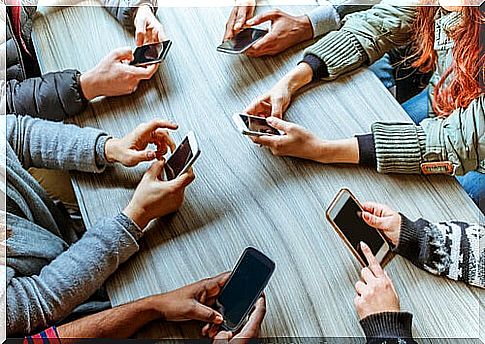Phubbing: When The Mobile Phone Destroys Relationships

Technology never ceases to surprise us. Every year there are new endless lists of mobile phones, computers and tablets, more and more modern. The same happens with applications and software, which always improve by equipping us with new ways of communicating with others. It is ironic that what connects us with people far away distances us from those close to us. Phubbing has come to stay.
The appearance of the first mobile phones represented a real revolution. Everyone was delighted to be able to converse so easily with people hundreds or thousands of miles away. Being able to move around with your mobile phone has favored the creation of new models, ever smaller and lighter.
What was once a novelty has slowly turned into an addiction called phubbing: people queuing for hours outside the shops to grab the latest model; adolescents who live only to please others on social networks and the consequent emergence of a whole series of new mental disorders.
What is phubbing?
The word phubbing was born in Australia a few years ago following the union of the terms phone (telephone) and snobbing (snubbing). It can be defined as ignoring or devaluing a person or environment in order to focus on any type of mobile technology.
The dependence produced by technology causes the individual to abstract from physical reality and pay more attention to the virtual one. It is currently a common phenomenon that affects a large part of the population, generating a real controversy.

All-out advocates of new technologies argue that phubbing is nothing more than collateral damage. They believe that this is the price to pay for always being connected to the world in real time and at low cost. The detractors, on the other hand, are quite critical of it. They believe that society, especially among the youngest, can see their life conditioned by this obsession.
The controversy has arisen not only for problems such as tendonitis, visual disturbances or back, neck or head pain. More and more accidents or investments related to distraction caused by the use of technology. The obsession with the search for approval and popularity in social networks generates, moreover, physical, psychological and social problems. Also, paying more attention to your cell phone than to your partner, friends or family is disrespectful and can lead to serious confrontations.
Diseases related to phubbing
There are some pathologies related to new technologies and, although phubbing is one of the best known, there are others more serious and unusual. In general they can be treated with the help of a specialist, but it must still be the person himself who realizes that he has a problem first.
FOMO (Fear of Missing out)
It is about the need to be constantly connected for fear of missing something. The obsession that leads to continuous access to WhatsApp or social networks is in this case pathological. The individual does not even wait to receive a notification, he continues undeterred to update the bulletin board.
They are people who are unable to leave the house without a cell phone, and they even refuse to go to a club or hotel that does not have WiFi.
Nomophobia
Nomophobia is the extreme panic experienced by the lack of a cell phone. It tends to appear when the phone is not working or has been stolen. People who suffer from it are victims of real attacks of anxiety and terror that greatly condition their perception of a fact that is in itself easily solved.
Just like FOMO sufferers, the main concern of those with nomophobia is that they miss something while they are disconnected. Many times, the money needed to repair it or buy a new one even goes into the background.
Cyber-hypochondria
Cyber hypochondria is one of the most common diseases. The Internet is a huge source of information, but it is good to make it clear that we are not dealing with a doctor. Many people prefer to search for their symptoms on the net and end up diagnosing themselves with phantom diseases that they don’t actually have.

Believing that any forum or portal can be trusted makes people hypochondriac and anxious. They convince themselves that they can have any disease, which can be very dangerous if they decide to self-medicate.
Imaginary Call Syndrome
Also known as the phantom vibration. People who suffer from it hear non-existent calls due to their extreme obsession with the phone. Even if the screen has not even turned on, the individual confidently claims to have heard the ringtone.
Google effect
Among the diseases associated with phubbing is the Google effect. This is one of the lesser known, but most significant long-term effects. The brain gets so used to searching for information on the internet that it ceases to assimilate what it discovers in a normal way. In the long term it can make you unable to retain information with very serious repercussions on memory.
New technologies can help us in many ways, but they can also cause big problems. If we pay more attention to what’s happening on screen rather than real life events, the consequences can be dire. Interacting with others and thinking about our health are much more important priorities than the Internet, always keep this in mind. Don’t fall into the dangerous net of phubbing.









